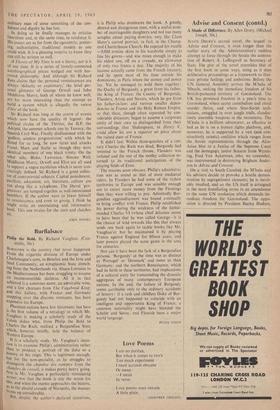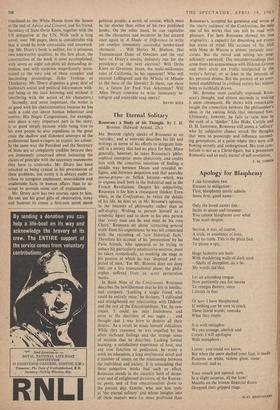Advise and Consent (contd.)
ALLEN Dauay's second novel, the 'sequel' to Advise and Consent, is even longer than the earlier story of the Administration's ruthless attempt to force through the Senate the nomina- tion of Robert A. Lefigngwell as Secretary of State. The plot of the novel resembles that of the first book in some ways, using as it does deliberative proceedings as a framework to illus- trate private feelings and ambitions. Before the UN General Assembly arrives the M'bulu of Mbuele, seeking the immediate freedom of his British-protected territory of Gorotoland. The UK has promised freedom in a year's time to Gorotoland, where secret cannibalism and ritual murder thrive, and where Sino-Soviet tech- nicians, smuggled in over jungle trails, clandes- tinely assemble weapons in the mountains. The M'bulu is a brilliant adventurer, as effective in bed as be is on a human Tights platform, and, moreover, he is supported by a vast (and con- structively satanic) coalition which ranges from the Soviet representatives through the Afro- Asian bloc to a Justice of the Supreme Court and the demagogic junior Senator from Wyom- ing, Fred Van Ackerman, who, we remember, was instrumental in destroying Brigham Ander- son in Advise and Consent.
On a visit to South Carolina the M'bulu and his advisers decide to provoke a hostile demon- stration by segregationist elements; he is inevit- ably insulted, and so the US itself is arraigned in the most humiliating terms in an amendment to the same UN resolution which demands im- mediate freedom for Gorotoland. The oppo- sition is directed by President Harley Hudson,
translated to the White House from the Senate at the end of Advise and Consent, and his friend, Secretary of State Orrin Knox, together with the US delegation at the UN. With such a long novel, over 700 pages, there is considerable risk that it could be both unreadable and unreward- ing. Mr. Drury's book is neither, for it possesses two noteworthy qualities. In the first place, the construction of the book is most accomplished, with seven or eight- sub-plots all demanding at- tention, and with suspense magnificently main- tained to the very end of these complex and fascinating proceedings. (Like Trollope or Thackeray, Mr. Drury dispenses a great deal of backstairs social and political information with- out being in the least knowing and without it interfering with the action of his characters.)
Secondly, and more important, the writer is so good with his characterisation because he has such a cold eye about human behaviour and motive. His Negro Congressman, for example, who plays a very important part in the story, is so good simply because while being true to his own people he also repudiates in the great crisis the shallow and dishonest attempts of the professional hand-wringers to exploit his colour. In the same way the President and the Secretary of State are so completely credible because they are immensely concerned about balancing the claims of principle with the necessary manoeuvres they have to undertake. Mr. Drury has been attacked as being cynical in his presentation of these problems, but surely it is always easier to refuse to recognise unpleasant, unavoidable and unalterable facts in human affairs than to at- tempt to provide some sort of explanation.
Mr. Drury now has two courses open to him. He can use his great gifts of observation, irony and humour to create a first-rate novel about
political people; a novel, of course, which must be far shorter than either of his two published books. On the other hand, he can capitalise on the characters and incidents he has created once again in A Shade of Difference to write yet another immensely successful jumbo-sized chronicle. . . . Will Harley M. Hudson, that Trumanesque Duke of Omnium and the real hero of Drury's novels, definitely run for the presidency in the next election? Will Orrin Knox or Governor Jason, the multi-millionaire ruler of California, be his opponent? Who will succeed Leffingwell and the M'bulu of Mbuele as the hero of the liberals? Is there, can there be, a future for Fred Van Ackerman? Will Allen Drury continue to write immensely in- telligent and enjoyable soap opera?
DAVID REES



































 Previous page
Previous page